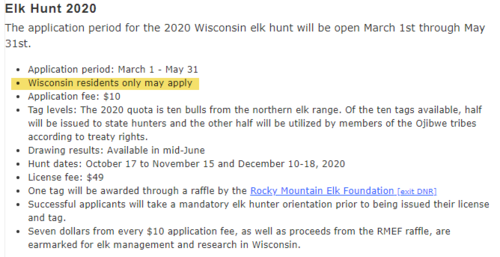406dn
Well-known member
- Joined
- Dec 12, 2019
- Messages
- 2,699
Generally speaking, it is not the obligation of any state to introduce non resident children to the wonders of hunting. It is a kind gesture if they knock some money off the price of tag or give them their own special days afield. But if they chose not to,,,it's fine by me.
The place to introduce a young person to hunting is close to home,, with easier hunts. It's not unlike, you don't expect a child to begin fishing with a fly rod using small dry flies.
Every state has opportunities to ignite the hunting passion. I took our son rabbit hunting on nice winter days, long before he ever hunted for elk. Hunting for squirrels or other small game will work also.
The fact is that big game hunting is beyond the means of a significant portion of the resident population in every state. It should not surprise anyone that non resident licenses price out a portion of interested hunters. But as stated above, if the tags did not cost a dime, there are many who can't swing the travel, lodging, time expense.
Every state with superior big game hunting, sells its non resident tags for a premium. They would be irresponsible to do otherwise. Their first obligation is to the resource, second to the public of the state. Non residents are well behind the first two.
The place to introduce a young person to hunting is close to home,, with easier hunts. It's not unlike, you don't expect a child to begin fishing with a fly rod using small dry flies.
Every state has opportunities to ignite the hunting passion. I took our son rabbit hunting on nice winter days, long before he ever hunted for elk. Hunting for squirrels or other small game will work also.
The fact is that big game hunting is beyond the means of a significant portion of the resident population in every state. It should not surprise anyone that non resident licenses price out a portion of interested hunters. But as stated above, if the tags did not cost a dime, there are many who can't swing the travel, lodging, time expense.
Every state with superior big game hunting, sells its non resident tags for a premium. They would be irresponsible to do otherwise. Their first obligation is to the resource, second to the public of the state. Non residents are well behind the first two.





